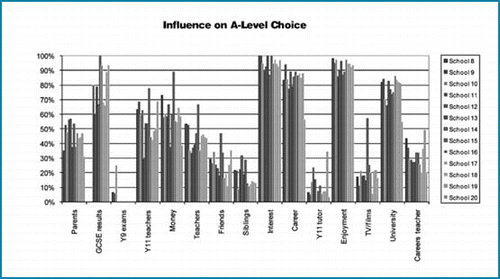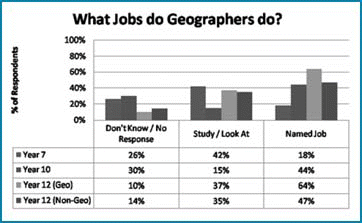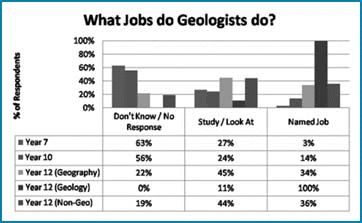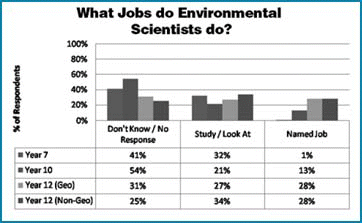Abstract
This paper discusses some of the findings of a 2005–07 GEES Subject Centre research project investigating school students’ perceptions of the GEES disciplines. Perceived career opportunities and interest in the subject tend to be important factors influencing degree subject choice. The data suggests, however, that there is a mismatch between students’ perceptions of career opportunities in the GEES disciplines and their own idea of getting a job, particularly at school years 7 and 10. The literature review conducted as part of this project noted that there is a cumulative process of evolving perception and achievement that influences degree subject choice and, for most people, this starts well before the age of 14 years. The challenge for the GEES community, therefore, is to find a way to market itself in order to make it highly relevant to children of all ages.
Introduction
Geography, Earth and Environmental Sciences are very much in the media at present. There is a wide variety of natural history television programmes and the news regularly contains references to natural disasters, climate change and so on. However, this coverage does not seem to translate into a demand for higher education courses in the disciplines, at least not in the same way that dramas such as Silent Witness have created a demand for forensic science courses (for example). So what are the perceptions of the disciplines? Developing an understanding of school students’ attitudes to, and perceptions of, the GEES disciplines will help to inform HE departments’ recruitment and retention strategies, as well as providing an opportunity to better promote the disciplines in schools, colleges and to the public.
From 2005 to 2007, the GEES Subject Centre conducted a pilot research project investigating school students’ perceptions of the GEES disciplines. The project involved a number of colleagues in university GEES departments throughout the UK and obtained written questionnaire responses from over 900 students in 20 schools across England, Scotland, Wales and Northern Ireland. The purpose of the questionnaire was to gain an understanding (albeit fairly basic) of young people’s perceptions of what the GEES disciplines are about and what careers might be available. It was intended to act as a pilot in order to identify key areas for further, more in-depth research.
This paper will focus on the students’ perceptions of the career opportunities afforded by Geography, Earth and Environmental Sciences. A full report on the research findings (including a comprehensive literature review conducted by Roger Trend, now at the Department of Educational Studies, University of Oxford) is available on the GEES Subject Centre website at http://www.gees.ac.uk/projtheme/stuperc/stuperc.htm.
Methodology
Further to a discussion meeting of the project team, a draft questionnaire was devised by Roger Trend and piloted with schools from south Wales. Ten schools were involved and the questionnaire was completed (under teacher supervision) by students from years 7, 10 and 12. As well as offering a chance to trial the questionnaire, this pilot study provided an opportunity to compare responses across a range of school years. Following this pilot, the questionnaire was revised slightly and then circulated to a further ten schools in England, Scotland and Northern Ireland for use with year 12 only (a copy of this latter questionnaire is available in the online report). The questionnaire included demographic information, Likert-scale style questions and open-text responses. The students were asked about their interest in school topics, perceptions of influences on their subject choice, what they think geography / geology / environmental science is all about, what jobs they think geographers / geologists / environmental scientists do and what interest, if any, they have in planet Earth and its people. The data were entered into an Excel spreadsheet to provide an electronic record (many thanks to Sian Evans, the GEES Subject Centre’s graduate placement student for her hard work on this) and then analysed statistically and qualitatively by the author.
It is important to note that the responses were obtained through a written questionnaire that was not overseen by a researcher (though teachers were provided with guidelines for administration of the questionnaire). The responses are likely to be the school students’ immediate thoughts on the subjects and may not represent fully considered opinions. In addition, differences in writing ability / speed may also have affected the range of responses. The data should be considered, therefore, as ‘food for thought’ and to provide indicators for further, more rigorous research rather than as definitive descriptors of the students’ understandings of the subjects.
(NB: It should be noted that the term ‘Geology’ was used rather than ‘Earth Science’ or ‘Geoscience’ as this is the title of GCSE and A-level courses. It was considered that students would be less familiar with the latter two terms. For this part of the GEES community, it would be interesting to explore these concepts further to ascertain the best terminology to use when marketing the subject. Although academics may be able identify a distinction between the three terms, it is probable that school students may not. Indeed, it could be conjectured that the Geological Society’s ‘Careers in Geoscience’ publication may not be attractive to students browsing through careers libraries if they are simply not familiar with the term.)
Influences on A-level Subject Choice
Other studies have suggested that perceived career opportunities, closely followed by current ability and performance, have the strongest influence on A-level students’ choice of subject for study at University (CitationMaringe 2006 and references therein). It follows, therefore, that there may be a relationship (albeit somewhat complex) between choice of A-levels and choice of subjects to study at HE. (MB There are as many different stories regarding subject choice at University as there are students — just ask any of your colleagues how they chose their degree — interestingly, however, there has been relatively little formal research in this area. Most research into HE choice tends to focus on the institution, rather than the subject. In addition, there are many studies asking school students about their intended choices, but far fewer that question undergraduates once they are at University.)
The year 12 students in the GEES research were asked to rank various factors according to how much influence they had had on their choice of A-level subjects. The responses were from a total of 664 year 12 students: 548 students from 10 schools from the final survey, and 110 student responses from three schools taken from those year 12 students participating in the pilot study (six students from the final survey did not provide any responses to any questions so were not included in the data analysis). Of the 548 students who responded to the final survey, 177 were studying geography/geology and 371 were non geology/geography students. Across all the schools, the responses were generally similar, with the following factors consistently being selected as ‘Very Important’ or ‘Important’:
My interest in the subject
My future career or job
My enjoyment of the subject
What I want to study at university
‘’How well I did in GCSEs’ and ‘How much money I can earn in my career’ received a relatively high rating when averaged across all the schools, but there was a greater spread of responses between schools than for the above four factors ().
Figure 1 Percentage of respondents from each school (not including those who responded ‘don’t know’) who indicated that a factor was ‘Very Important’ or ‘Important’.

The total data for all the schools were analysed for differences in responses between males and females. Statistically significant differences in responses were found for the following factors (using the Chi-squared test):
How well I did in GCSEs (more girls than boys indicated that this was ‘Very Important’ or ‘Important’: 1% confidence level)
How much money I can earn in my career (more boys than girls indicated that this was ‘Very Important’ or ‘Important’: 1% confidence level)
My enjoyment of the subject (more girls than boys indicated that this was ‘Very Important’ or ‘Important’: 5% confidence level)
The main influences of GCSE results, Interest, Career, Enjoyment and University found here, reflect the findings of other research studies into student choice at GCSE and 17+ levels (e.g. CitationAshworth & Evans, 2001; Garratt, 1985; Rolfe, 2001; Weeden, 2007).
Perceptions of Careers in GEES
The GEES Subject Centre research and that of others highlights perceived career opportunities and interest in the subject as the important factors potentially influencing degree subject choice. If this is the case, then in order to ensure recruitment into Geography, Earth and Environmental Sciences, the disciplines must be familiar, interesting and relevant to school students both in terms of content and career opportunities. In order to gain a broad understanding of school students’ current perceptions of careers in the GEES disciplines the questionnaire asked students to provide a freetext answer to the question ‘What jobs do you think geographers do?’ (and similarly for geologists and environmental scientists). For comparison, they were also asked about their own career aspirations.
The following data analysis illustrates the range of responses from years 7 and 10 (from the pilot study) and year 12 from the final study only. In the analysis phase of this study, the year 12 responses from the pilot study and the final survey were kept separate due to the slightly differing questionnaires used. As a greater number of responses were received in the final survey, this has been used in this analysis rather than the pilot responses (however, there is broad agreement between the two datasets).
Career Aspirations
The school students were asked what career or job they wanted to do when they finished their education. Their first choice options are outlined below:
Year 7 Students (aged 11+)
64% stated a named job
24% wanted to be professional sports people
6% suggested a topic which interested them (e.g. ‘working with others’ or university)
1 student wanted to run their own business
7 students (4% of 165) offered no response
The students named a total of 44 different jobs. Those that were named by three or more students were:
Year 10 Students (aged 14+)
63% stated a named job
7% wanted to be professional sports people
9% suggested a topic which interested them (e.g. ‘something in computers’)
4 students wanted to run their own business
20 students (17% of 117) didn’t know or offered no response
The students named a total of 39 different jobs. Those that were named by 3 or more students were:
Year 12 Students (final study)(ages 16+) Forty-two of the 177 students studying Geography and/or Geology at A-level (‘Geo’ students), and 86 of the 371 non-Geo students didn’t know what they wanted to do or offered no response. The other responses were categorised as follows:
The jobs that were named by 3% or more students were:
Of the students studying Geography /Geology, the following discipline-related vocations were named (the number of responses is provided in parentheses): Geologist (2); Conservationist (1); Volcanologist (1); Palaeontologist (1); Ocean Scientist (1); Environmental Management (1)
To summarise, the percentages of school students who provided named jobs when asked about their own career aspirations were 64% in year 7, 63% in year 10 and 61% in year 12 (Geo and non-Geo combined).
Perceptions of GEES-related Careers
Students were asked ‘what jobs do you think geographers / geologists / environmental scientists do? (each asked separately). The categories of responses for each disciplines are illustrated graphically in figures 2a,b and c (please note that some students provided responses in more than one category). A further category that featured for geography jobs only was ‘Travel or Explore’: 18% of year 7 and 10, and 5% of year 12 respondents suggested this.
Figure 2a Categories of responses from each year group regarding their perceptions of careers in geography.

Discussion
As illustrated in below, at all school years the majority of students think about their future career in terms of a named job. In many cases these are jobs which are ‘seen’ on a regular basis (either directly or through the media) e.g. doctors, vets, teachers, journalists: Below : How students think about their future career When asked what jobs they thought geographers, geologists and environmental scientists might do, interestingly, at all school years many students could not come up with a named job, but wrote something vague such as ‘study rocks’, ‘travel the world’ and so on. Of those jobs they could name, the greater proportion were again those that are ‘seen’ e.g. weatherperson / meteorologist, teacher (although lots of jobs were suggested, mostly these were only by one or two students). Of all the students, those studying Geology A-level had the best idea of the variety of jobs in their subject area (all 19 students were able to name geology-related vocations).
Table 1 How students think about their future career
It could be inferred, therefore, that because school students tend to think in terms of named jobs, and because many such jobs in GEES are ‘hidden’ (i.e. you don’t tend to meet them on a regular basis), it is difficult for students to see the relevance of studying these disciplines in their lives. Where the students’ own career aspirations matched their year group’s suggested GEES jobs (see table above) these tended to be in areas not necessarily related to GEES HE courses (e.g. architecture, journalism, archaeology, engineering etc).
Of the 946 students surveyed only nine mentioned wanting to pursue a career directly related to the GEES disciplines (2 oceanographer, 3 geologists, 1 conservationist, 1 environmentalist, 1 volcanologist and 1 environmental manager). It can be argued, of course, that GEES graduates can move into a wide variety of jobs. However, many of the GEES-related jobs suggested by the students actually require study in a different degree subject (e.g. archaeology, architecture, engineering). Many students also suggested ‘study…’ or ‘look at…’ as possible jobs for geographers, geologists and environmental scientists. However, only four out of the 946 students surveyed mention the word ‘research’ as a career aspiration.
It could be inferred from the data that there is a mismatch between students’ perceptions of career opportunities in the GEES disciplines and their own idea of getting a job, particularly at years 7 and 10. The literature review noted that there is a cumulative process of evolving perception and achievement that influences degree subject choice and, for most people, this starts well before the age of 14 years. The challenge for the GEES community, therefore, is to find a way to market itself in order to make it highly relevant to children of all ages.
These findings, regarding the perceived relevance of career opportunities in the GEES disciplines reflect those reported in the literature review (in particular in CitationLord & Johnson’s 2005 review of the National Curriculum) and anecdotal evidence from colleagues in the GEES communities, for example:
…for quite a long time now, I have been giving a presentation to schools, colleges, careers advisors etc focusing on the societal and personal value of the subject knowledge, skills and attributes that are developed (and which are very attractive to employers) via the study of Geography and Environmental Science. The response to this talk is generally very positive and usually involves surprise about the nature of the subjects and the range of careers graduates enter.
Mike McGibbon, University of Greenwich
Conclusions and Recommendations
This study was intended to act mainly as a pilot to identify key areas for further, more in-depth research. The resourcing of the project was such that, although a common questionnaire and teacher-guidelines were sent to all participating schools, it was not possible for a team member to attend each questionnaire-completion session. It cannot be guaranteed, therefore, that the conditions were exactly the same in each school. In addition, the students were asked to write their response — variations in writing ability and effort put into the task will also affect the responses. For example, it is likely that the responses are ‘off the top of the student’s head’ rather than having been well considered. Furthermore, the data analysis was to some extent subjective and another author might select different categories. Even with these caveats, however, it is still possible to draw out some strong conclusions and recommendations for future work.
There are many career avenues through which a degree in GEES may take a graduate (and some apparently tangential to the content of the courses) and this is a great strength of the disciplines. However, the research suggests that around two-thirds of the school children surveyed tend to think about their own careers in terms of named jobs. A small number are more general (e.g. I want to do something with computers) and, in our survey, none of the year 7 or 10 students mentioned a GEES subject and only 4 of the 664 year 12 students wanted to do ‘something related to’ GEES. This research and that of others suggests that school students may be unaware of the usefulness of the GEES disciplines for their future careers.
This project has indicated that a lot more work needs to be done to enhance school children’s understanding of the relevance and usefulness of the GEES disciplines. Subject choice is an evolving process that begins well before A-level and even GCSE. Outreach activities must start early in the school curriculum and be sustained through to HE.
There are many examples of pockets of outreach activity in GEES but these mostly occur in each of the disciplines separately. It is the author’s belief that it is timely for the overall GEES community to come together to develop a more strategic approach. By increasing the overall number of children interested in studying planet Earth and its people, each discipline will be drawing from a larger pool.
Perhaps fully fledged ‘GEES’ academics find it difficult to remember a time when they didn’t know about the disciplines. So, school children themselves should be involved in developing outreach activities, to ensure that they are being communicated with in their own language and assumptions are not being made about what they already know or don’t know.
So, what activities might the GEES community pursue?
Further research is certainly required in order to gain a deeper understanding of the perceptions of the disciplines.
To follow up this project, it would be interesting to get the school students to study and illustrate the usefulness and relevance of the GEES disciplines, for example through running a poster competition.
Other ideas? Please contact the author.
Acknowledgements
Many thanks are due to our colleagues in the GEES community who were involved with this project (listed below) and to the school teachers and children who contributed to the research.
References
- AshworthJ., & EvansJ. L. (2001). Modelling student choice at secondary and tertiary level: a cross-section study. Journal of Economic Education, 32(4), 311-320
- FoskettN., DykeM., & MaringeF. (2004). The influence of the school in the decision to participate in learning post-16 (Mo. RR538). Nottingham: Department for Education and Skills
- GarrattL. (1985). Factors affecting subject choice at A-level. Educational Studies, 11(2), 127-132
- LordP., & JohnsonA. (2005). Pupils’ Experiences and Perspectives on the National Curriculum and Assessment: fourth update of the research review. http://www.qca.org.uk/downloads/pdf_05_1694_pupil_update_report_march05.pdf
- MaringeF. (2006) University and course choice: Implications for positioning, recruitment and marketing. International Journal of Educational Management Vol. 20 Issue 6 pp 466-479
- RolfeH. (2001). The effect of tuition fees on students’ demands and expectations: evidence from case studies of four. Retrieved March 21st, 2006, from http://www.niesr.ac.uk/pubs/searchdetail.php?PublicationID=152
- WeedenP. (2007). Students’ perceptions of geography: decision-making at age 14. Geography, Vol 92(1), 62-73

